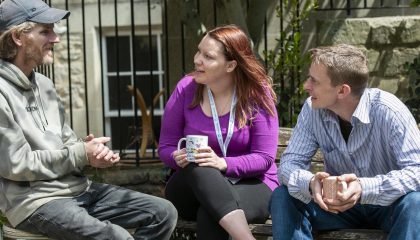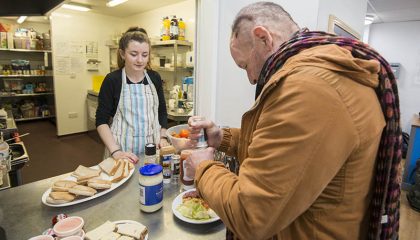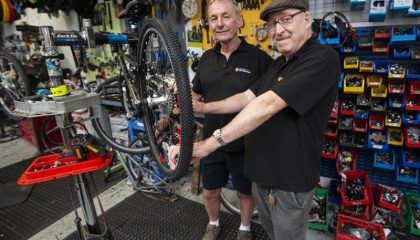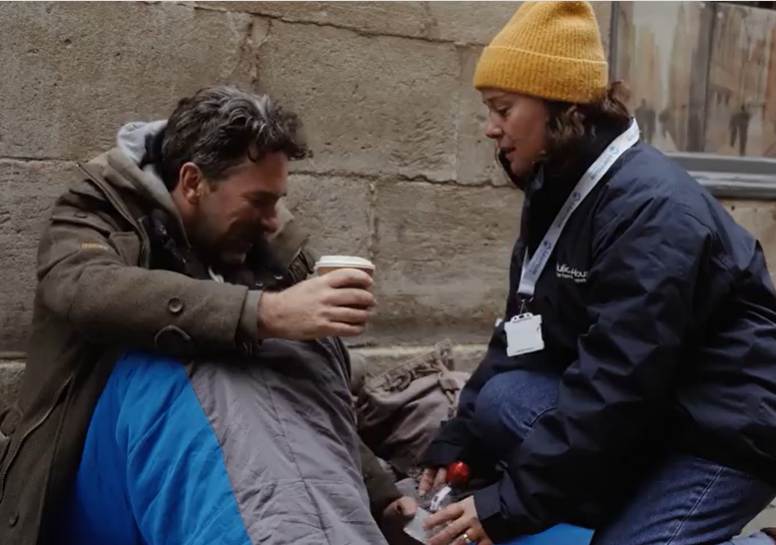
Domestic violence and abuse is one of the many reasons people can end up sleeping rough or leading a street-based lifestyle. In the past few years, homelessness due to domestic abuse has increased by around 30%.
With the United Nation’s 16 Days of Activism against Gender-Based Violence running from November 25th to December 10th, we spoke to Donna – the Renew Service Manager of our Domestic Violence and Abuse team.
What sort of support does your team provide?
Our team provides good-quality, safe refuge accommodation where women, men and children can recover from their experiences and trauma in a non-judgemental, supportive setting. Our projects are made up of accommodation sizes from a 1-bedroom flat for a man or woman with or without children, to an 8-bed shared house for single women with children.
We also provide access to benefits/ legal advice and other specific advice and support such as and immigration. Our residents can receive support with housing, employment, training and hobbies. All of which can be tailored to children and families, as well as parents with drug and alcohol difficulties. We also help our residents to develop life skills and have a Freedom Programme for women.
What is the Freedom Programme?
The Freedom Programme is a 12-week course that runs three times a year. It promotes positive changes and recovery for women in a supportive environment. It brings together women who have all had similar experiences, to learn from and support one another.
The course is popular and is currently run online via Teams every Monday and our clients can opt in and out depending on need. It is facilitated by our Children and Domestic Violence Advocate (CIDVA) and our referral coordinator/well-being support worker.
How do people get referred to your services?
Survivors can self-refer to our service by calling us direct or they can be referred by an agency who is supporting them. This could be Children’s Services, Police, A&E, GP, Probation, D&A Services or a Mental Health professional.
How do you help clients move on from your services?
Once we have helped them to find appropriate accommodation, all of our residents are offered 3 months ‘move on’ support from their support worker. This allows us to support them moving into their new home, apply for grants and support them to ensure that everything is in place and that they are safe. This can be extended for a further 3 months if the resident is particularly vulnerable.
Their support worker will visit them on a weekly basis to check in with them and make sure that everything is ok.
What motivates you in your work?
I am motivated by the great work that my team do every day, the hard work that they put in to ensure that the women, men and children receive a great service and are kept safe.
I am also motivated by the successful outcomes. Seeing a survivor finally move on into their own property and start a new life is amazing. I have so much admiration that they haven’t given up and that they have continued to work hard to recover from their trauma.
What are some common misconceptions about domestic abuse?
“If it was that bad, she’d leave.”
Survivors stay in abusive relationships for many different reasons, and it can be very difficult for a woman or man to leave an abusive partner – even if they want to.
Like any other relationship, one that ends in abuse began with falling in love and being in love. Abuse rarely starts at the beginning of a relationship but when it is established, meaning often it is harder to leave.
“They must have been provoked.”
This myth is widespread and deep-rooted. It is often based on the belief that the man is the head of the family, and that his role is to punish his partner or children if they act in a way he doesn’t approve of.
It is an especially dangerous myth because any reference to ‘provocation’ means that we are blaming the victim and relieving the abuser of responsibility for their actions.
Abuse or violence of any kind is never the victim’s fault. Responsibility always lies with the perpetrator, and with them alone.
“Domestic abuse always involves physical violence.”
Domestic abuse does not always include physical violence. It is defined as an incident or pattern of incidents of controlling, coercive, threatening, degrading and violent behaviour, including sexual violence, by a partner or ex-partner.
These incidents can include coercive control and abuse, whether it is psychological and/or emotional sexual; financial; harassment; stalking and/or online or digital abuse.
What would you like people to know about your work?
Our team take on specialist roles which include: the service manager, two domestic violence advocate (DVA) case work co-ordinators, a children’s independent domestic violence advocates (CIDVA), a family support worker, a housing management officer and two part-time roles – a specialist drug & alcohol support worker and a referral coordinator/well-being worker.
It’s an amazing client group to work with, challenging and demanding but extremely fulfilling. To know that we have supported someone who has experienced trauma and abuse to start their journey and recover is very rewarding.
What are the biggest challenges you face in your work?
Our biggest challenges are usually around funding for our residents and housing. In our current climate, funding is harder to get especially for residents who need to collect their belongings from the property they fled. This can cost hundreds of pounds and funding is not always available. Some challenges that our residents face include waiting a long time to be re-housed – some have waited for over a year.
Resident parking is another issue that they experience, as there is no parking in Bath. We are only allowed two parking permits for our 8-bed property so if we received a referral from someone needing to park their car, we wouldn’t be able to accommodate them due to that issue.
If you would like to donate, you can do so here.
If you are experiencing domestic abuse and need help, please contact us on 01225 310899 and at renew@julianhouse.org.uk for Refuge Referrals.






